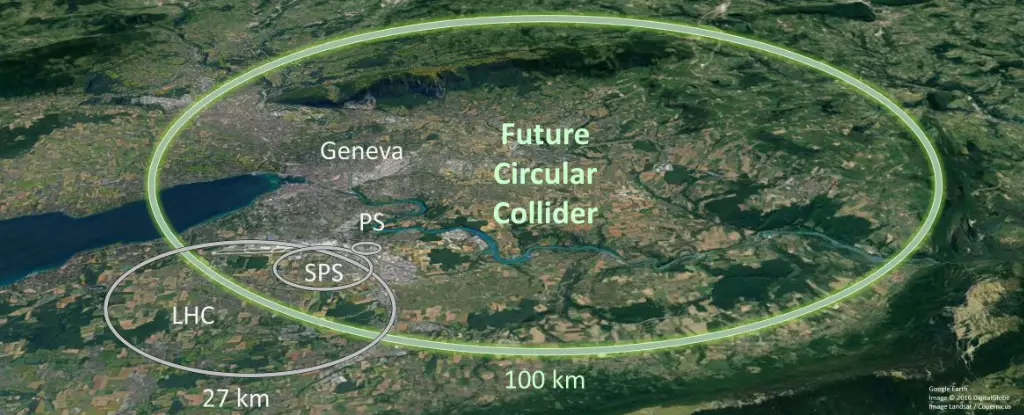CERN’s ambition to construct the Future Circular Collider (FCC) is an audacious move in the realm of fundamental physics. The current Large Hadron Collider (LHC) has captured the world’s imagination and significantly advanced our understanding of the universe, particularly with the discovery of the Higgs boson. However, as CERN’s director, Fabiola Gianotti, exclaims, “real competition” from countries like China looms overhead. This sense of urgency might be driving the push for the FCC, but at what cost?
The FCC’s projected cost of approximately $17 billion raises eyebrows across the political and scientific spectrum. The endeavor is not merely an academic pursuit; it serves as a statement on Europe’s dominance in scientific exploration. Yet, this colossal price tag begs the question: should Europe be allocating its resources to a single, grandiose project when numerous smaller, potentially equally impactful initiatives exist? The lure of being at the forefront of science should not overshadow the pressing realities faced by society today.
Community Backlash and Environmental Concerns
The local community’s reactions to the FCC proposal paint a more complicated picture. As the project threatens to consume vast expanses of agricultural land, farmers like Thierry Perrillat voice their fears of losing not just their land but their very livelihoods. It’s easy for scientists and policymakers to champion radical scientific advancements, but they must also reckon with the daily lives and concerns of those living in close proximity to proposed research sites. The conflict echoes the biblical tale of David and Goliath; the enormity of the project vs. the voices of individuals with much to lose.
Moreover, environmental repercussions are essentially ignored amid the allure of scientific advancement. Critics argue that the FCC will further exacerbate climate issues through its “astronomical electricity consumption.” The sustainability of such a giant project appears tenuous, as the environmental association Noe21 articulates the project’s implications. It begs the question: is it prudent to invest in an enormous scientific facility when we are confronted with urgent environmental crises? We are at a crossroads, one where progress should not come at the expense of our planet’s health.
The Financial Dilemma
CERN’s member states must decide by 2028 whether to endorse the FCC funding, a decision complicated by the financial reservations expressed by key contributors, including Germany. Despite CERN’s spokesperson Arnaud Marsollier suggesting that up to 80% of the costs might be covered by the organization’s budget, the skepticism lingers. With public expenditure stretched thin across various sectors, why should taxpayers fund a project perceived by some as an extravagant scientific gamble? The notion that such massive resources should flow into a single facility—while universities, smaller research projects, and even vital social programs languish—stirs resentment and disbelief.
Physics has always thrived on collaboration and gradual incremental advancements rather than singular monumental endeavors. Investing in various promising scientific initiatives might yield more versatile benefits and possibly groundbreaking discoveries, all while respecting the socio-economic context in which they exist.
The Ideal of Progress vs. Critical Realities
The dichotomy between the pursuit of knowledge and the tangible responsibilities towards communities and the environment raises complex ethical questions. While projects like the FCC stand to potentially answer some of humanity’s most profound questions, one must critically analyze whether this singular pursuit justifies its costs. Advocates, including physicist Olivier Cepas, have pointed out that smaller projects might provide more achievable and numerous scientific breakthroughs.
The mayor of Ferney-Voltaire may extol the benefits of the FCC in improving local employment and energy resources, but is that enough to justify the upheaval brought by such a gargantuan project? Shouldn’t developmental initiatives be pursued in harmony with societal needs and environmental responsibilities?
It is crucial for all stakeholders—scientists, community members, and policymakers—to engage in an open dialogue about the implications of such often touted “pharaonic projects.” The future of scientific exploration should not merely be defined by grand aspirations but also by a well-rounded assessment of ethical responsibilities and real-world impacts. The allure of prestige must not eclipse the realities on the ground, for true progress emerges when the binary ideals of advancement and responsibility coexist harmoniously.

